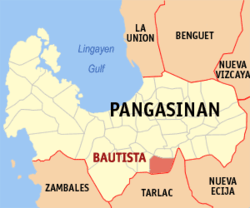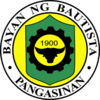Bautista, Pangasinan
| Bautista | ||
|---|---|---|
| Municipality | ||
|
| ||
| ||
 Map of Pangasinan showing the location of Bautista | ||
.svg.png) Bautista Location within the Philippines | ||
| Coordinates: 15°47′N 120°30′E / 15.783°N 120.500°ECoordinates: 15°47′N 120°30′E / 15.783°N 120.500°E | ||
| Country |
| |
| Region | Ilocos (Region I) | |
| Province | Pangasinan | |
| District | 5th District, Pangasinan | |
| Founded | May 5, 1900 | |
| Barangays | 18 | |
| Government[1] | ||
| • Mayor | Amado Totaan Espino (Nationalist People's Coalition) | |
| • Vice Mayor | Joseph Guinto Espino (Nationalist People's Coalition) | |
| Area[2] | ||
| • Total | 46.33 km2 (17.89 sq mi) | |
| Population (2010)[3] | ||
| • Total | 30,193 | |
| • Density | 650/km2 (1,700/sq mi) | |
| Time zone | PST (UTC+8) | |
| ZIP code | 2424 | |
| Dialing code | 75 | |
| Income class | 4th class; rural | |
| Website | www.bautista.gov.ph | |
Bautista is a fourth class municipality in the province of Pangasinan, Philippines. According to the 2010 census, it has a population of 30,193 people.[3] Bautista is called the “The Walis Tambo (broom) Capital of Pangasinan”.[4] It is honored as the "Lupang Hinirang".[5]
Geography
Bautista is located east of Pangasinan part of the Pangasinan's Fifth Congressional District with a land area of 8,213 hectares and 32 kilometers off Dagupan. Bautista is bounded by Alcala, Pangasinan, north; Bayambang, south, Agno River and Moncada, Tarlac, east.[4]
Barangays
Bautista is politically subdivided into 19 barangays:[2]
- Artacho
- Baluyot
- Bersamin
- Cabuaan
- Cacandongan
- Diaz
- Nandacan
- Nibaliw Norte
- Nibaliw Sur
- Palisoc
- Poblacion East
- Poblacion West
- Pogo
- Poponto
- Primicias
- Ketegan
- Sinabaan
- Vacante
- Villanueva
Barangay Poblacion West is the site where the lyrics of the Philippine National Anthem were written, and it is known as the “Home of the Philippine National Anthem”. In 1899, Jose Palma wrote his poem “Filipinas” which became the Anthem's lyrics.[6]
History
Boletin Ecclesiastico de Filipinas published that the Dominicans founded Pangasinan towns of Binalatongan (City of San Carlos, 1588), Calasiao, 1588, Mangaldan, 1600, Manaoag, 1608, Lingayen, 1614, Dagupan, 1614 and Telbang (now Bautista, 1614). A historian, Rosario Cortez, however, wrote that Bautista existed since 1686, but was removed to the Parish of Bayambang.
The “Rebirth of Bautista” as municipality was only in 1900. Don Ramon Reynado became the first town executive along with other notable founder: Guillermo Agcaoile, Francisco Gonzales, Felipe Ramos, Dionisio Galvan, Teodoro Carungay, Claudio and Antonio Galsim, Marciano Guzman, Nicolas Galsim, Marcelino Villanueva and Eleno Cayabyab.
Bautista was dubbed “mercancia” or "Melting Pot" (where cargoes due to Camiling, Tarlac were traded via the Agno River or by train(. The municipality was truly a melting pot, indicative of which is the diversity of people’s dialects and languages. The residents of the town were Pangasinenses, Ilocanos, Tagalogs, Pampangos, Chinese and Spanish. The people of Nibaliw, Baluyot and Cabuaan are mostly Pangasinenses. The people of Nandacan, Villanueva, Poponto, Primicias, Artacho and Pogo are predominantly Ilocanos. Within the Poblacion, one would be able to meet a number of people with different persuasions, ideals and expression in varied dialects and language.
Bautista natives's livelihood are farming, broom making (fiber, tanobong and midribs), dressmaking, sawali making, buro making, building construction, auto mechanics, basketry, bag making, blacksmithing, pottery, ceramics and hollow blocks making and rattan crafts. The residents also have clay, cattle, poultry, bamboo, rattan, anahaw, abiang, fishes, sugar, basi, vinegar and coconut, including watermelon and onion, its principal product.
1907 to 1920 was its golden years until San Quintin-Paniqui rail road line was opened, thus Bautista lost to Rosales, Tayug and San Quintin. The big floods of 1934 and 1972 almost annihilated the flood-prone town.[7]
Demographics
| Population census of Bautista | ||
|---|---|---|
| Year | Pop. | ±% p.a. |
| 1990 | 21,280 | — |
| 1995 | 23,375 | +1.77% |
| 2000 | 27,066 | +3.19% |
| 2007 | 28,094 | +0.52% |
| 2010 | 30,193 | +2.66% |
| 2015 | 32,307 | +1.30% |
| Source: National Statistics Office[3][8] | ||
Climate
| Climate data for Bautista, Pangasinan | |||||||||||||
|---|---|---|---|---|---|---|---|---|---|---|---|---|---|
| Month | Jan | Feb | Mar | Apr | May | Jun | Jul | Aug | Sep | Oct | Nov | Dec | Year |
| Average high °C (°F) | 31 (88) |
31 (88) |
31 (88) |
33 (91) |
32 (90) |
32 (90) |
30 (86) |
30 (86) |
30 (86) |
31 (88) |
31 (88) |
31 (88) |
31.1 (88.1) |
| Average low °C (°F) | 21 (70) |
21 (70) |
22 (72) |
24 (75) |
24 (75) |
24 (75) |
23 (73) |
23 (73) |
23 (73) |
23 (73) |
23 (73) |
22 (72) |
22.8 (72.8) |
| Average precipitation mm (inches) | 5.1 (0.201) |
11.6 (0.457) |
21.1 (0.831) |
27.7 (1.091) |
232.9 (9.169) |
350.8 (13.811) |
679.8 (26.764) |
733.1 (28.862) |
505 (19.88) |
176.6 (6.953) |
67.2 (2.646) |
17.7 (0.697) |
2,828.6 (111.362) |
| Average rainy days | 3 | 3 | 3 | 4 | 14 | 18 | 23 | 25 | 22 | 15 | 8 | 4 | 142 |
| Source: World Weather Online[9] | |||||||||||||
Local government
The official seal of Bautista has “BAYAN NG BAUTISTA” amid the green color (agricultural area, the gear, farming developments, the carabao).[10]
Hon. Amado “Pogi” Ignacio Espino III it its Municipal Mayor, while Hon. Joseph “Jojo” G. Espino is Municipal Vice Mayor/ SB Presiding Officer.
Sangguniang Bayan Members are: Hon. Jesus “Jun Jun” A. Villanueva Jr., Hon. Ramon A. Carbonell Jr., Hon. Carlos V. Pagsolingan, Hon. Mario V. Ferrer, Hon. Johnny R. Escano, Hon. Dominador C. Ramos, Hon. Manuel A. Carbonell Jr., Hon. Simplicio C. Petinez Jr., Hon. Amadeo T. Espino, Liga ng mga Barangay President, Provincial Board Member, Hon. Albino M. Mejia Sr. – OIC Liga ng mga Barangay and Hon. Joshua Czar P. Espino – SK Federation President.[11]
Alcala March to Righteousness
The Alcala December 5, 2012 "March to Righteousness" was launched to have joined the Ombudsman of the Philippines observance of 9 December International Anti-Corruption Day United Nations Convention against Corruption (UNCAC), General Assembly of the United Nations (UN). Recently, Alcala held its Incident Command System Training, the Bautista LGU-Pangasinan, the Malacanang & Google hold MapUp Session, the 23rd National Statistics Month (NSM) and Philippine Civil Service Anniversary 2012.[12]
Education
Bautista Schools include Baluyot, BNHS, Bautista Central School, CNHS and St. John Institute and A. Diaz, Sr. Elementary School, inter alia.
Tourism
Bautista celebrates Philippine Eagle Week from June 4, 2012 to June 10, 2012 (Presidential Proclamation No. 79).[13]
In the "Parada Na Dayew", a festivals of Pangasinan towns in the 432nd anniversary of April 11, 2012, Bautista Float Entry "Lupang Hinirang" claimed the 1st runner-up trophy with a cash of P 75, 000 and trophy.[14]
- Maekrisanne Resort, Bautista Police Building, Bautista Municipal Park, Bautista Municipal Auditorium, Rural Bank of Bautista (Pangasinan), Inc. and Jose Palma Historic Place
- 2nd Buntis Congress was held at Bautista[15] (August 15, 2012 at Maekrisanne Garden Resort attended by 134 participants).[16]
1723 Parish Church of St. John the Baptist
Bautista derived its name from Saint John the Baptist (“Voice of the Wilderness and the Precursor of the Lord”), hence its town fiesta on 23 and 24 June, the nativity of St. John, the Baptist.[17]
The Parish Church of St. John the Baptist (F-1723), Poblacion East, Bautista, 2424 Pangasinan has a population of 19,547 Catholics with Parish Priests, Rev. Rafael Mesa and Rev. Rolando A. Fernandez.[18] It is a part of the Vicariate IV: Queen of Peace,[19] under the jurisdiction of the Roman Catholic Archdiocese of Lingayen-Dagupan.[20][21][22] Its Vicar Forane is Rev. Fr. Alberto T. Arenos.[19][23][24]
Image gallery
-
Bautista Municipal Hall
-
Bautista police building and Town Hall
-
Municipal health office
-
Bautista municipal park and auditorium
-
Old house
References
- ↑ "Official City/Municipal 2013 Election Results". Intramuros, Manila, Philippines: Commission on Elections (COMELEC). 1 July 2013. Retrieved 3 September 2013.
- 1 2 "Province: PANGASINAN". PSGC Interactive. Makati City, Philippines: National Statistical Coordination Board. Archived from the original on 14 November 2012. Retrieved 26 November 2012.
- 1 2 3 "Total Population by Province, City, Municipality and Barangay: as of May 1, 2010" (PDF). 2010 Census of Population and Housing. National Statistics Office. Archived from the original (PDF) on 15 November 2012. Retrieved 26 November 2012.
- 1 2 "Archived copy". Archived from the original on 2015-05-03. Retrieved 2012-12-18.
- ↑ http://www.bautista.gov.ph/?attachment_id=353[]
- ↑ http://www.bautista.gov.ph/?page_id=172[]
- ↑ http://www.bautista.gov.ph/?page_id=110[]
- ↑ "Province of Pangasinan". Municipality Population Data. LWUA Research Division. Retrieved 3 September 2013.
- ↑ "Bautista, Pangasinan: Average Temperatures and Rainfall". World Weather Online. Retrieved 24 September 2015.
- ↑ http://www.bautista.gov.ph/?page_id=275[]
- ↑ http://www.bautista.gov.ph/?page_id=401[]
- ↑ http://www.bautista.gov.ph/?p=1120[]
- ↑ http://www.bautista.gov.ph/?page_id=691[]
- ↑ http://www.bautista.gov.ph/?page_id=349[]
- ↑ http://www.pia.gov.ph/news/index.php?article=1941345800595[]
- ↑ http://www.pia.gov.ph/news/index.php?article=1941345790626[]
- ↑ http://www.bautista.gov.ph/?page_id=105[]
- ↑ "Archived copy". Archived from the original on 2016-03-03. Retrieved 2014-12-21.
- 1 2 "Archived copy". Archived from the original on 2016-05-15. Retrieved 2012-12-18.
- ↑ "Archived copy". Archived from the original on 2012-09-04. Retrieved 2013-09-08.
- ↑ "Archived copy". Archived from the original on 2012-07-29. Retrieved 2014-09-28.
- ↑ "Archived copy". Archived from the original on 2016-03-31. Retrieved 2014-12-23.
- ↑ "Archived copy". Archived from the original on 2014-02-02. Retrieved 2013-09-08.
- ↑ "Archived copy". Archived from the original on 2016-03-10. Retrieved 2013-09-08.
Sources
- Boletin Ecclesiastico de Filipinas
- Rosario Cortez, PANGASINAN, 1901-1986: A Political, Socio Economic and Cultural History
External links
| Wikimedia Commons has media related to Bautista, Pangasinan. |
- Bautista Website
- Official Website of the Provincial Government of Pangasinan
- Philippine Standard Geographic Code
- Philippine Census Information
- Local Governance Performance Management System
- Bautista.org
 |
Alcala | Santo Tomas |  | |
| Bayambang | |
San Manuel, Tarlac Moncada, Tarlac | ||
| ||||
| | ||||
| Camiling, Tarlac | Moncada, Tarlac |
